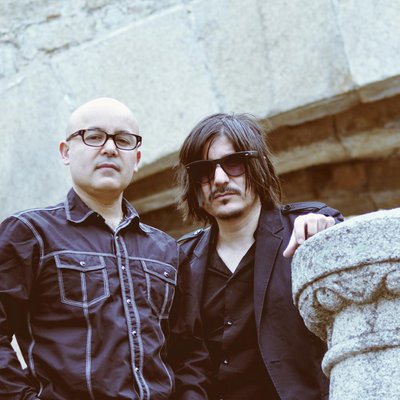
Every culture lives in a state of duality, whether it’s past versus present, left versus right or some other ying yang. But few places have a physical barrier marking the binary like the border city of Tijuana, Mexico, where life, love and culture literally straddle a wall. This is where the sounds of the Nortec Collective, and its major players Bostich + Fussible, were born.
“This is a group that represents a region that is neither Mexico or the United States,” says Edward Olivos, an associate professor specializing in bilingual education and bicultural parent involvement at the UO Department of Education Studies. Olivos, originally from San Diego — another border town, was key in bringing the Grammy-nominated Bostich + Fussible to the McDonald Theatre Nov. 23, in effect introducing the town to Mexitrónica. Mexitrónica essentially combines regional Mexican music with electronica — think the baja sexto, trumpet, accordion and synthesizers.
Olivos wanted to bring Bostich + Fussible, or electronic producers Ramón Amor Amezcua Sánchez and Pepe Mogt, for their first Pacific Northwest performance to introduce the University of Oregon and surrounding areas to contemporary Mexican music. “When I came to Eugene, I felt like I went back to the 1970s or so,” Olivos says of the local Latino music scene. While folkloric dance music and mariachi are important, he says, there “really is a broad spectrum of Mexican music.”
Bostich + Fussible were first introduced to the electronic genre in the 1980s with pioneers like Kraftwerk, Cabaret Voltaire and The Human League, Mogt says, before cutting their teeth on drum machines and synthesizers. They fused these techno sounds with norteño — a genre of traditional Mexican music; the word nortec is the combination of norteño and techno.
With them, the duo brings the documentary Tijuana: Sonidos del Nortec, which delves into the backstory of Tijuana’s Nortec Collective — the expansive group of musicians, artists and auteurs that spawned Bostich + Fussible — and what it’s like to create art and write music in such a polarizing political hotspot. The doc will have a free public screening, followed by a Q&A with Bostich + Fussible, the night before the concert.
Of creativity at the border, Mogt says that “most artists reflect that in their work,” and that “living here, the influence of both sides of the border is very noticeable.” To sum it up in the most fundamental way, it may be best to look at Mogt’s hit song “Tijuana Makes Me Happy”: “Some people call it the happiest place on Earth / Others say it’s a dangerous place / It has been the city of sin / But you know I don’t care / What I care about is to see you again.”
The hour-long documentary was so popular in its home country, Olivos says, that it was televised nationally. The world has also taken notice: The pair has been featured in books such as Paso del Nortec: This is Tijuana and Nor-tec Rifa!: Electronic Dance Music from Tijuana to the World, and the Mexitrónica music movement, with Bostich + Fussible at the helm, has garnered an international following in Latin American, Europe, Japan and California. Olivos remembers hearing Bostich + Fussible on the radio when he lived in San Diego.
Olivos hopes that the event opens up the community to contemporary Latino culture. “Oregon is really a different space as far as Latino music,” he says. “If we had done this in San Diego, it would have been sold out in a day.”
The free public screening of Tijuana: Sonidos del Nortec will start at 6 pm Friday, Nov. 22, in the auditorium of the Global Scholars Hall on the UO campus. Bostich + Fussible play 8 pm Saturday, Nov. 23, at the McDonald Theatre; $10 adv., $15 door.